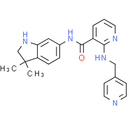Description
Motesanib, also known as AMG-706, is the orally bioavailable multiple-receptor tyrosine kinase inhibitor with potential antineoplastic activity. Motesanib selectively targets and inhibits vascular endothelial growth factor (VEGFR), platelet-derived growth factor (PDGFR), kit, and Ret receptors, thereby inhibiting angiogenesis and cellular proliferation.
Product information
CAS Number: 453562-69-1
Molecular Weight: 373.45
Formula: C22H23N5O
Synonym:
AMG 706
AMG706
motesanib free base
Related CAS Number:
857876-30-3 (Motesanib phosphate)
Chemical Name: N-(3, 3-dimethyl-2, 3-dihydro-1H-indol-6-yl)-2-[(pyridin-4- ylmethyl)amino]pyridine-3-carboxamide
Smiles: CC1(C)CNC2=CC(=CC=C12)NC(=O)C1=CC=CN=C1NCC1C=CN=CC=1
InChiKey: RAHBGWKEPAQNFF-UHFFFAOYSA-N
InChi: InChI=1S/C22H23N5O/c1-22(2)14-26-19-12-16(5-6-18(19)22)27-21(28)17-4-3-9-24-20(17)25-13-15-7-10-23-11-8-15/h3-12,26H,13-14H2,1-2H3,(H,24,25)(H,27,28)
Technical Data
Appearance: Solid Power
Purity: ≥98% (or refer to the Certificate of Analysis)
Solubility: DMSO: 75 mg/mL(200.83 mM). Water: Insoluble.
Shipping Condition: Shipped under ambient temperature as non-hazardous chemical or refer to Certificate of Analysis
Storage Condition: Dry, dark and -20 oC for 1 year or refer to the Certificate of Analysis.
Shelf Life: ≥12 months if stored properly.
Stock Solution Storage: 0 - 4 oC for 1 month or refer to the Certificate of Analysis.
Drug Formulation: To be determined
HS Tariff Code: 382200
How to use
In Vitro:
Motesanib has broad activity against the human VEGFR family, and displays > 1000 selectivity against EGFR, Src, and p38 kinase. Motesanib significantly inhibits VEGF-induced cellular proliferation of HUVECs with an IC50 of 10 nM, while displaying little effect at bFGF-induced proliferation with an IC50 of >3, 000 nM. Motesanib also potently inhibits PDGF-induced proliferation and SCF-induced c-kit phosphorylation with IC50 of 207 nM and 37 nM, respectively, but not effective against the EGF-induced EGFR phosphorylation and cell viability of A431 cells. Althouth displaying little antiproliferative activity on cell growth of HUVECs alone, Motesanib treatment significantly sensitizes the cells to fractionated radiation.
In Vivo:
Motesanib (100 mg/kg) significantly inhibits VEGF-induced vascular permeability in a time-dependent manner. Oral administration of Motesanib twice daily or once daily potently inhibits, in a dose-dependent manner, VEGF-induced angiogenesis using the rat corneal model with ED50 of 2.1 mg/kg and 4.9 mg/kg, respectively. Motesanib induces a dose-dependent tumor regression of established A431 xenografts by selectively targeting neovascularization in tumor cells. Motesanib in combination with radiation displays significant anti-tumor activity in head and neck squamous cell carcinoma (HNSCC) xenograft models. Motesanib treatment also induces significant dose-dependent reductions in tumor growth and blood vessel density of MCF-7, MDA-MB-231, or Cal-51 xenografts, which can be markedly enhanced when combined with docetaxel or tamoxifen.
References:
- Polverino A, et al. AMG 706, an oral, multikinase inhibitor that selectively targets vascular endothelial growth factor, platelet-derived growth factor, and kit receptors, potently inhibits angiogenesis and induces regression in tumor xenografts. Cancer R
- Kruser TJ, et al. Augmentation of radiation response by motesanib, a multikinase inhibitor that targets vascular endothelial growth factor receptors. Clin Cancer Res, 2010, 16(14), 3639-3647.
- Coxon A, et al. Broad antitumor activity in breast cancer xenografts by motesanib, a highly selective, oral inhibitor of vascular endothelial growth factor, platelet-derived growth factor, and Kit receptors. Clin Cancer Res, 2009, 15(1), 110-118.
Products are for research use only. Not for human use.
Payment & Security
Your payment information is processed securely. We do not store credit card details nor have access to your credit card information.


